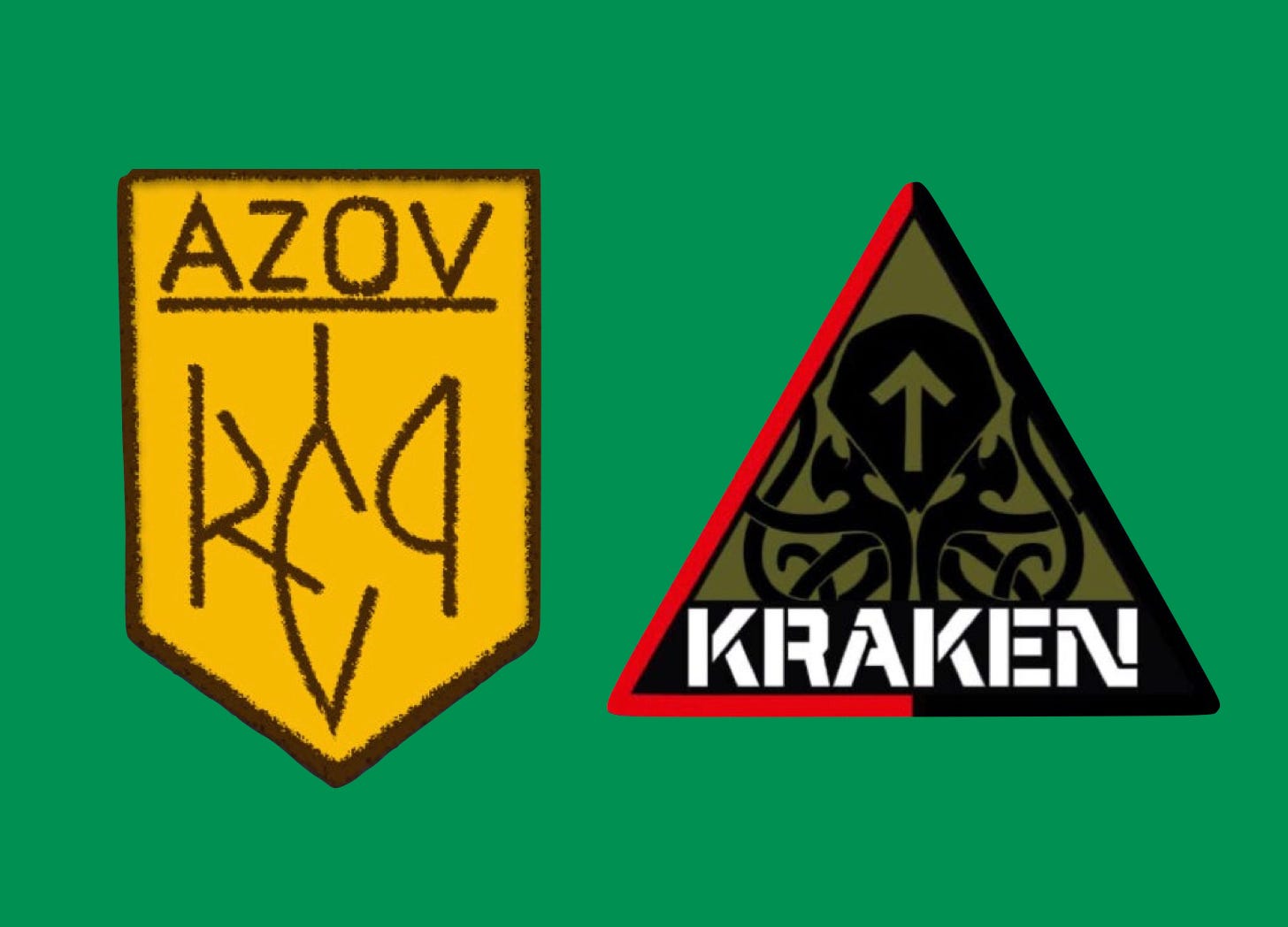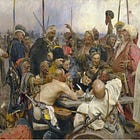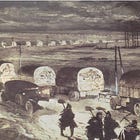On 25 March 2022, elements of the organization run by Kostiantyn Nemichev, as well as Nemichev himself, took part in an attack on the village of Vilkhivka, some eight kilometers east of the nearest point in the city of Kharkiv.1 In the course of this attack, which succeeded in bringing the village under Ukrainian control, six members of Nemichev’s unit lost their lives.2
Two days later, Nemichev posted a video of his men riding towards Vilkhivka in sport utility vehicles and deploying on the outskirts of the town. While the intro to the video featured the new Kraken logo, the footage showed Nemichev wearing the brown-and-yellow Azov patch that had made its debut on 11 March 2022.
On 30 March 2022, Nemichev posted a video about his old friend Serhiy “Chili” Velichko, who had been given command of the 226th Reconnaissance and Sabotage Battalion earlier that month. The video, which begins with footage of Velichko leading an anti-Russian protest march in 2014, shows him at Vilkhivka wearing the brown-and-yellow Azov patch.3 (The paragraph posted alongside the video described Velichko as “commander of Kharkiv’s reconnaissance-sabotage battalion Azov, which is part of the Kraken unit.”)
Soon thereafter, a second, much longer, video profile of Velichko featured two versions of the Azov patch, one in the original brown-and-yellow color scheme and an otherwise identical emblem in which those colors were replaced by black and olive drab. Made by the YouTube channel Bombardier, this half-hour program included a discussion in which Velichko denied any connection between the Azov organization and ideologies such as Fascism and National Socialism.
In the month of April 2022, Nemichev worked hard to build the Kraken brand. He started a Telegram channel devoted exclusively to the Kraken organization, organized a program to deliver food to needy people in the city of Kharkiv, and called from the renaming of places in the city that bore the name of “Moscow.” (These included the district in which he had spent his childhood.) Nemichev also made several posts calling for recruits to join the “Special Unit Kraken.” (One of these, which suggested a willingness to poach soldiers from other units, announced that Kraken would be able to arrange for the transfer of men with experience operating tanks and armored personnel carriers.)
At the same time, neither Nemichev nor Velichko made any mention of either the territorial defense battalions they commanded or the brigade to which they belonged. On 11 April 2022, Nemichev posted an announcement that explained this strange omission. The Kraken Special Unit, it explained, was an “intelligence-sabotage” unit that reported directly to the Ministry of Defense. The Kraken organization, moreover, had nothing whatsoever to do with the 225th Territorial Defense Battalion, the 226th Territorial Defense Battalion, or the 127th Territorial Defense Brigade.
This article makes extensive use of material posted on the Telegram channels of Kostiantyn Nemichev and the Kraken Special Unit, as well as the Facebook page of the First Nationalist Hub.
For a version of this article with recent improvements and older comments:
For other articles in this series:
For other articles about the war in Ukraine:
To share, support, or subscribe:
Curiously, in all of his Telegram posts related to this battle, Nemichev refers to the village by its Russian name of Olkhovka.
The Telegram post announcing the loss of the six members of the unit included a memorial card for each of the men killed. This card featured a photo of the man who died, the date and location of his death, and picture of a burning Viking long ship, and his nickname spelled out in Runic letters.
Prior to the start of the war in 2014, Serhiy Velichko had gained a degree of fame in certain circles in the city of Kharkiv as the author of a chant, often performed by crowds at games of the Metalist soccer club, that mocked Russian President Vladimir Putin. Sung to the tune of the old American novelty song “Speedy Gonzalez,” the chant featured a refrain which family-friendly translators might render as “Putin is a weenie.”









